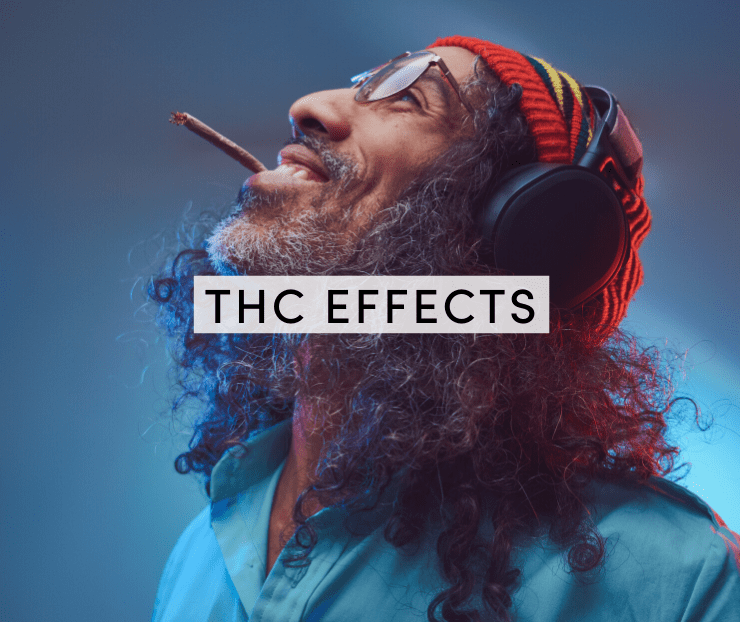THC Effects That Marijuana Users Should Know About

Posted on January 23rd, 2021
It is common knowledge that marijuana has psychoactive effects. The resulting euphoria is likely largely responsible for the popularity of the substance as a recreational drug. Recent discoveries have linked these psychoactive effects to a compound in cannabis called tetrahydrocannabinol or THC. However, THC has a variety of other effects – some of which are beneficial and some which are not. Understanding these effects is critical to weighing the risks vs. the benefits of THC. Determining dosage, possible drug interactions and contraindications for certain medical conditions, diseases and illnesses is crucial. Although extensive research has increased in the last couple of decades, information is still lacking on THC effects.
Below are some of the effects of THC and why they occur.
THC Effects on the ECS
The endocannabinoid system (ECS) in the human body is a relatively recent discovery.It controls or regulates a number of different functions within the body. The body produces endocannabinoids which bind with receptors in the ECS. This either inhibits or stimulates chemicals such as neurotransmitters in the brain.
So far, scientists have found 113 different cannabinoids in the cannabis plant. These cannabinoids are called phytocannabinoids. THC is just one of these phytocannabinoids. However, when THC is introduced into the body, it floods the ECS. This may prevent natural endocannabinoids from binding with receptors. It is possible this disrupts the fine balance of regulating the interaction of neurotransmitters with the brain.
The overstimulation of certain neurotransmitters can interfere with the brain’s ability to recognize emotions and act appropriately. The effects of this could include:
– Slow reaction time and impaired motor skills.
– Lowered inhibitions which leads to greater risk taking.
– Difficulty recalling or storing new information.
– Difficulty concentrating or focusing.
– Disorientation.
– Increased anxiety, panic and paranoia.
– Increased food and sexual cravings.
 Psychoactive THC Effects
Psychoactive THC Effects
The result of overstimulating neurotransmitters like dopamine and serotonin is the feeling of getting “high” or “stoned.” Both of these chemicals are associated with mood as well as the reward system and pleasure center in the brain. The effect of THC is therefore largely pleasure oriented and results in mild to extreme euphoria and relaxation.
These effects can last anywhere from one hour to three hours – although THC takes much longer to be entirely flushed from the body. THC passes into the bloodstream via the lining of the lungs (when inhaled by smoking or vaping) or the digestive tract (when consumed or eaten). The liver then processes it and passes it into the urine where it leaves the body.
However, it can be stored in fatty tissue for a period of time and take up to 30 days to be flushed entirely from the body. It is only the metabolites that are stored and no psychoactive effects should be present.
Potential for Addiction
The psychoactive properties of THC are the primary cause of occasional marijuana abuse and addiction. The brain craves more and more of the compound. Greater doses or more regular use may be required for the desired level of euphoria to be reached.
While it is believed that only 10% of people get addicted to marijuana, recent studies have shown that 1/3rd of users are likely to develop some type of dependency or Marijuana Use Disorder.
Chronic users are more likely to develop a dependency on THC whereas occasional and moderate users are unlikely to become addicted. THC dosage also plays a role. Marijuana with a higher THC content is more likely to form habits. There is also evidence to suggest that a genetic predisposition may play a role in whether or not addiction occurs. However, it is the mind-altering properties of THC that are primarily responsible for causing addiction.
THC Effects on the Brain
The brain continues to develop until around the age of 25 years. While it is developing, it is more susceptible to permanent changes and damage. While it is unlikely, heavy adolescent marijuana usage can have lasting effects.
Brain imaging studies and other research shows that THC can have the following long-lasting or permanent effects:
– Adults who frequently smoked marijuana during adolescence have a lower IQ of around 6 points. THC affects the ability to retain and recall information and therefore learn.
– The frontal cortex is particularly prone to damage leading to problems with planning, decision-making and judgment in later life.
– Brain imaging studies have found that the reward and pleasure centers of the brain are larger.
– Changes in the volume and density of grey matter.
– Damage to the white matter in the brain which is critical to neural communication in the brain. This may lead to greater impulsivity or lowered inhibitions and greater risk taking.
– Difficulty managing emotions leading to inappropriate responses.
The frontal cortex is one of the last areas of the brain to develop. This is the reason why adolescents and young adults often make poor choices. There is a significant lack of understanding consequences of behavior and taking these into account before acting. THC can delay or permanently disrupt the development of the frontal cortex to the extent that good decision-making skills never develop.
 Restrictions
Restrictions
In the United States, minors under the age of 21 years cannot use marijuana. There is some debate as to whether the legal age should be 25 years old. Others believe that far more research is necessary to fully understand THC effects on the developing brain. Users should also weigh the health benefits in a risk-benefit analysis.
Regular use is 5 to 7 times a week. Chronic use is multiple times a day. There is little evidence to suggest that the effects are present in occasional users (less than 3 times a week).
Users should also take THC concentration or dosage into account. Different strains of marijuana have varying percentages of THC. The higher the concentration of THC in the marijuana, the greater the likelihood and severity of the damage. Extended use may also contribute to greater risk.
THC Effects on the Heart
Elevating or increasing heart rate can be one of the most significant effects of using marijuana. Many believe that this increase is to compensate for a sudden drop in blood pressure, but research has not found why this occurs. Some think THC is responsible for the increase instead of any of the other 112 cannabinoids that are present in marijuana.
Heart rate can increase by between 30 and 50 beats per minute just moments after smoking marijuana. This is a significant increase and creates a greater risk of heart attack or stroke. It will almost never cause a heart attack or stroke, but people who have cardiovascular disease are at a higher risk.
THC Effects on the Liver
The liver processes THC, so it can be affected in a few different ways. These effects can either be positive or negative and the severity of the impact on the liver differ. Frequency of use and potency of the marijuana play important roles in these effects.
For example, marijuana can alleviate stress on the liver from alcoholism. However, non-alcoholics who are chronic marijuana users may develop liver diseases such as fibrosis. Occasional users are unlikely to suffer any damage to the liver.
THC may also change the effects or other medications that the liver processes. Some medications may become more effective while others may lose some efficacy. Doctors dose prescription medications carefully in order to avoid serious side effects while delivering the greatest benefit. If THC effects the potency, it may no longer provide the same benefits. Increased efficacy can lead to unpredictable side effects. Users should consult a medical practitioner before using THC or marijuana along with prescription medications.
Conclusion
There is still a great need for more clarity regarding THC effects. We need much more research into both the benefits and the negative effects of the cannabinoid. Until then, it is a matter of whether the benefits outweigh the risks in deciding whether to use THC. You should also always consider legal restrictions and regulations wherever you live.
If you are apprehensive about heavy THC use, you may still want to consider trying other cannabinoids. Scientists consider CBD to be extremely safe, as well as beneficial for a number of reasons. Many use full spectrum hemp extracts to help with sleep, anxiety, and pain relief. Tanasi is a company that produces only the highest quality hemp extracts, and will ship anywhere in the US.



